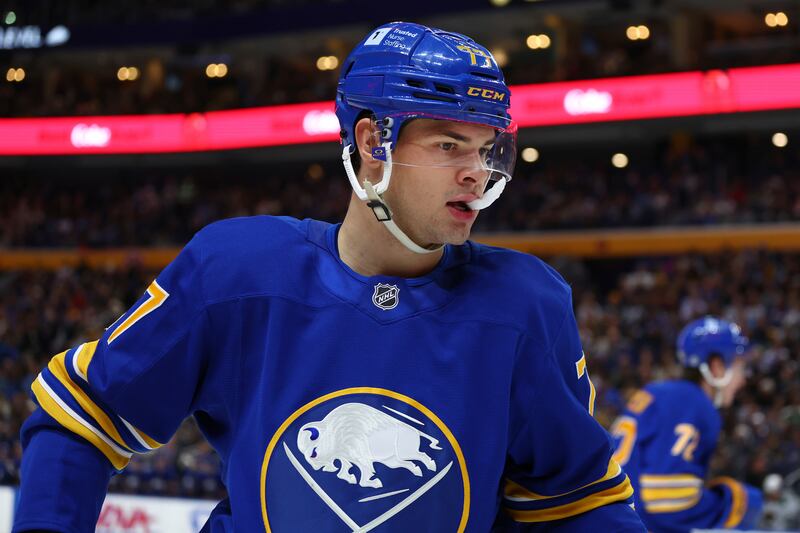Social media was flooded Thursday morning with remorseful remarks from Buffalo Sabres fans. In their collective mind, they lost Wednesday night’s trade which sent JJ Peterka to the Utah Mammoth in exchange for Josh Doan and Michael Kesselring.
It was no secret that Peterka was on the move, but many fans found the return underwhelming. For that reason, the early consensus is that Mammoth GM Bill Armstrong has won yet another trade.
Armstrong certainly deserves credit. When he took the reins of the Arizona Coyotes in 2020, he had a subpar roster and a shallow prospect pool to deal with. As he quickly approaches the five-year mark of his tenure, he boasts one of the most promising young lineups in the league — and the Peterka trade only adds to it.
Doan and Kesselring were fan favorites in Utah, which makes this a tough pill for the NHL’s newest fanbase to swallow. But Armstrong did a good job of separating the people from the players.
“Sometimes, you have to trade players that you truly love,” Armstrong said in a press conference Thursday afternoon. “We had that last year with Moser and Geekie to get Sergachev. Those are the toughest calls you have to make, of two kids that were in the fight with us, that were homegrown.”
Utah had a logjam on defense, so someone was going to have to depart — especially if Dmitry Simashev and Maveric Lamoureux were going to get any playing time next season. And as beloved as the Doan family is, it’s still unclear what Josh will become.
The risk for Utah — and the upside for Buffalo — is that both Doan and Kesselring have yet to even come close to their potential. Sometimes all it takes is opportunity for good players to turn into stars, and these guys could both do exactly that.
Get to know JJ Peterka
Here’s a cool tidbit: John-Jason “JJ” Peterka wears number 77 because if you put a mirror at the top of the numerals, it shows his initials. It’s unclear whether his new contract, worth $7.7 million annually, has to do with that too.
On the ice, Peterka is as dynamic as any player his age. He scores in creative ways, and his wrist shot is good enough to rival that of Dylan Guenther. According to NHL Edge, Peterka was in the 94th percentile in shot speed among forwards last year (Guenther was in the 93rd percentile).
That should come in handy on the power play — one of his areas of expertise, and an area where Utah could have used some extra help last year. The roster wasn’t deep enough to have high-scoring forwards on the second power play unit, which resulted in PP2 almost never scoring. This move likely pushes Nick Schmaltz to the second unit.
What the trade doesn’t solve is Utah’s relative lack of size in the top six. Peterka is listed at an optimistic six feet (those numbers are often inflated for undersized players).
Additionally, Peterka has yet to figure out the defensive side of the game on an elite level. Head coach André Tourigny doesn’t have much time for offensive-only players, so Peterka will have no choice but to put more focus on keeping the puck out of his own net.
Armstrong said Peterka was “excited to come to Utah” and mentioned the new practice facility, the Delta Center environment and the overall direction of the team as factors in that.
How far along in the rebuild are the Utah Mammoth?
If you’ve listened to an Armstrong press conference, you probably already know his rebuild theory: It takes 8-10 years from the day a team drafts its best players to the day it wins the Stanley Cup.
Having Peterka in the fold won’t necessarily speed the rebuild up, but rather make the Mammoth a better team when it comes time to contend.
“Every little piece of momentum helps,” Armstrong said on how the deal affects the rebuild.
If there’s one franchise to keep an eye on, it’s Utah. Only 15 U24 players scored 60 points or more last season, and the Mammoth now have three of them (Peterka, Guenther and Logan Cooley).
Peterka and Guenther are both signed to long-term deals at decent dollar values. They’re looking to do the same with Cooley — though it’s likely that he’ll get a lot more money than either of those teammates. If they’re successful, they’ll have a solid trio that can grow up together.

